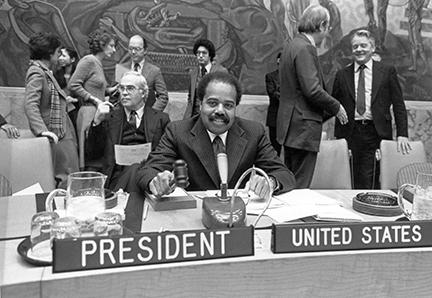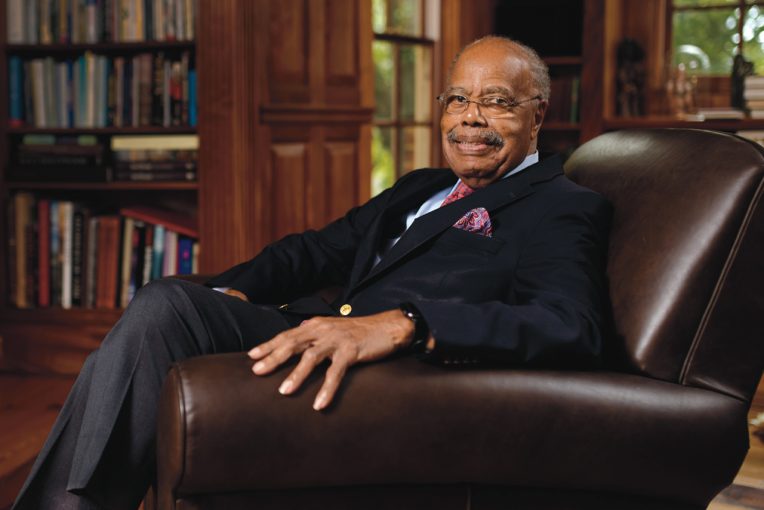Distinguished Alum Donald McHenry ’57 never worked for the president who said “Speak softly but carry a big stick.” But during his life as an international diplomat, where he’s partnered with other presidents, McHenry has lived out Theodore Roosevelt’s famous approach to foreign policy.
Serving as deputy U.S. representative to the United Nations Security Council in 1979, McHenry spent two years leading to the successful negotiation of United Nations Security Council Resolution 435. It became the basis of the settlement of the then 32-year dispute between the United Nations and South Africa over the independence of Namibia in Southern Africa.
McHenry subsequently became widely known as the principal negotiator during a 72-hour standoff with the Soviet Union at Kennedy Airport in New York, de-escalating what could have become a major dispute.
Appears InSoon after, President Jimmy Carter appointed the East St. Louis native as the United States Ambassador and Permanent Representative to the U.N. because of his use of caution, precision, and ability to choose words carefully. Those characteristics made McHenry an invaluable player at the table in U.S. foreign diplomacy for decades.
He is one of the best orators to ever step foot on Illinois State’s campus. The Kappa Delta fraternity confirmed his excellence by naming him the country’s most outstanding collegiate debater in 1957. McHenry, however, believes actions speak louder than words and that the United States has historically persuaded by example.

He is troubled that current rhetoric is affecting the credibility of the country abroad, noting that we cannot successfully encourage other nations to pursue shared governance, human rights, and civic participation if we are not practicing each at home.
“I have always been concerned with the tendency of many to describe the United States as the ‘indispensable nation,’” McHenry said. “We don’t need to tell people. They will recognize our importance by our policies and our actions.”
Perhaps the country could follow McHenry’s own life example, where his body of work has spoken for him. That all started as a student leader at Illinois State. He was heavily involved in forming the local NAACP chapter, later serving as the campus president.
He helped address discriminatory housing and business policies in Bloomington-Normal during the 1950s, a crucial time for race relations in the United States. A social science graduate, he was captain of the debate team that went toe-to-toe with some of the top schools in the United States.
McHenry appreciated the education and experience the University provided him, believing it helped pave the way for a career on the world stage. The feeling is mutual, as the campus proudly welcomed him back when he received the Lincoln Laureate, the state’s highest honor for professional achievement and public service during the summer.
“I was very pleased with the framework Illinois State provided. It was an excellent grounding for me,” McHenry said, adding the he learned while at ISU the importance of preparation.
“In some way, we have to be sure that this more informed population can assimilate the information that is available to them in a way that’s not disruptive.”
Donald McHenry
The debate team taught him to be an expert on his own point of view, as well as the counter argument. He appreciated the slow, reasoned exchange of views and ideas and soon realized that listening is just as important as speaking.
That mindset gave him the confidence to negotiate with people of power later in his career, especially at such a pivotal time in geopolitical history highlighted by the Iranian hostage crisis, the Soviet invasion of Afghanistan, and the continued conflict in the Middle East.
McHenry, who began his global politics ascension at the State Department in 1963, fears debating has taken on an entertainment element in today’s world, where the lines between negotiation and affirmation blur. He is also concerned that a 24-hour news cycle has made it easier to be misinformed.
“When there is a disagreement on basic facts, it is much more difficult—and dangerous—to even discuss policy either at home or abroad,” he said. “In some way, we have to be sure that this more informed population can assimilate the information that is available to them in a way that’s not disruptive,” said McHenry, who believes diplomats, politicians, and leaders can be both team players and people of principle—even in polarizing times.
He is walking proof of that, as McHenry went on leave-without-pay from the State Department in 1971 after expressing his disagreement with the United States’ involvement in Vietnam and Southeast Asia.
“You can believe that you will always be in complete agreement with what is decided,” McHenry said. “The question is to what extent you are involved or identified with a particular policy and how close that policy comes to your own personal principles. If the policy crosses that line or comes so close that you believe you cannot in good conscience be part of it, you have an obligation to leave.”
McHenry’s decision not to stay silent because of career consequences opened the door for other opportunities, while also allowing him to stay true to himself. During his time away from the State Department, he joined various think tanks in New York City and Washington, D.C.

Donald McHenry, shown in the 1957 Index, when chosen while an undergraduate as “the outstanding debater in the United States as announced at the Nebraska Invitational Tournament.”
He also started teaching classes at Georgetown University, where he is Distinguished Professor Emeritus in the Practice of Diplomacy at the Walsh School of Foreign Service. He taught as well at Southern Illinois University, Howard University, and American University.
After resigning from the State Department in 1973, McHenry took a position at the Carnegie Endowment for International Peace where he focused on humanitarian policy studies. During the election of 1976, he served on a foreign affairs advisory group in the Carter campaign and following the election, served on the foreign affairs transition team led by incoming Secretary of State Cyrus Vance.
At the urging of Vance—who described McHenry as “extraordinarily able”—McHenry was appointed as Ambassador and Deputy U.S. Representative on the United Nations Security Council until 1979, when President Carter appointed him Permanent Representative of the United States to the United Nations, succeeding Andrew Young.
Now age 85, McHenry has slowed but stays active as a member of the Global Leadership Foundation, the American Ditchley Foundation, the Brookings Institution, the Advisory Committee of the Ford Foundation International Fellows Program, and the Council on Foreign Relations. He also remains involved in higher education and has spent the past two years launching the McHenry Fellows Program at Georgetown.
He’s encouraged by young people showing a dedication to equality and human rights, and is confident that they are more receptive to differences than ever before. He hopes that selfless mindset from future leaders and decision makers can get the country back to leading by example.
In an era where people are more informed and well traveled than ever before, McHenry urges young people to find their niche, have confidence in their abilities, and use their skills to leave the world better than they found it.
The words of wisdom are meant for Illinois State students and alums as well. After all, it will be up to future generations to continue moving the stick forward with actions, not words.

